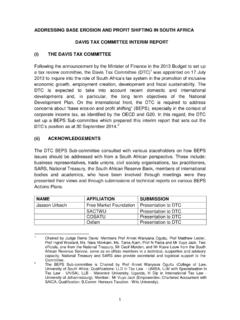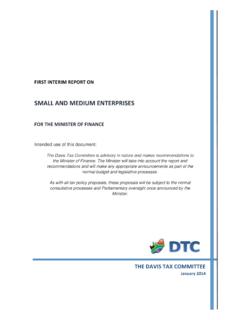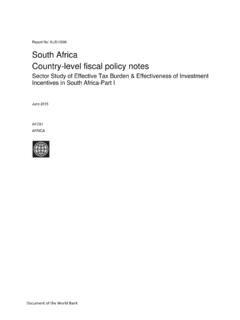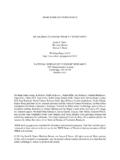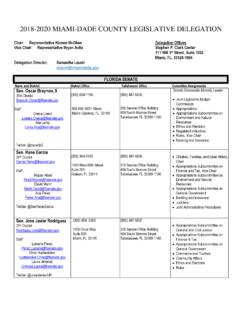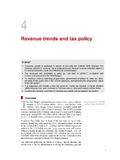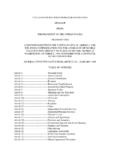Transcription of FINANCING A NATIONAL HEALTH INSURANCE FOR SOUTH …
1 REPORT ON FINANCING A NATIONAL HEALTH INSURANCE FOR SOUTH AFRICA FOR THE MINISTER OF FINANCE Intended use of this document: The davis Tax Committee is advisory in nature and makes recommendations to the Minister of Finance. The Minister will take into account the report and recommendations and will make any appropriate announcements as part of the normal budget and legislative processes. As with all tax policy proposals, these proposals will be subject to the normal consultative processes and Parliamentary oversight once announced by the Minister. THE davis TAX COMMITTEE March 2017 FINANCING a NATIONAL HEALTH INSURANCE for SOUTH Africa FINANCING A NATIONAL HEALTH INSURANCE (NHI) FOR SOUTH AFRICA GLOSSARY ACA (USA) Affordable Care Act AUGE (Chile) Universal Access and Explicit Guarantees BBP Basic Benefits Package BRIICS Brazil, Russia, India, Indonesia, China and SOUTH Africa CPMF (Brazil) Contribui o Provis ria Sobre Movimenta o Financeira DTC davis Tax Committee FTE Full time equivalent GNI Gross NATIONAL Income GP General Practitioner GST (Australia) Goods and Services Tax HPI HEALTH Provider Index HPRS HEALTH Patient Registration System HTA HEALTH Technology Assessment IMSS Mexican Social Security Institute ISSTE (Mexico)
2 Institute for Social Security and Services NHC NATIONAL HEALTH Commission NHI NATIONAL HEALTH INSURANCE NHIS (Ghana) NATIONAL HEALTH INSURANCE Scheme NHS (UK) NATIONAL HEALTH Service NRCMS (China) New Rural Cooperative Medical Scheme OECD Organisation for Economic Co-operation and Development OHSC Office of HEALTH Standards Compliance OOP(E) Out Of Pocket (Expenditure) PHC Primary HEALTH Care PIT Personal Income Tax PMB Prescribed Minimum Benefits PPACA (USA) Patient Protection and Affordable Care Act SAPPF SOUTH African Private Practitioners Forum SHI Social HEALTH INSURANCE SIS (Peru) Seguro Integral de Salud SUS (Brazil) Sistema Unica de Saude UCS (Thailand) Universal Coverage Scheme UEBMI (China) Urban Employee Basic Medical INSURANCE UHC Universal HEALTH Coverage UK United Kingdom URBMI (China) Urban Resident Basic Medical INSURANCE USA United States of America VAT Value Added Tax WHO World HEALTH Organisation FINANCING a NATIONAL HEALTH INSURANCE for SOUTH Africa TABLE OF CONTENTS 1 THE davis TAX COMMITTEE AND ITS MANDATE.
3 1 2 DEFINITION OF THE NHI .. 2 3 RATIONALE FOR THE NHI .. 2 4 PRINCIPLES AND FEATURES OF THE NHI .. 4 5 NHI INSTITUTIONAL DESIGN AND IMPLEMENTATION .. 6 6 INTERNATIONAL TRENDS IN UHC FINANCING .. 11 Selected countries experience .. 17 Cost pressures: international experience .. 20 Fiscal sustainability of benefit packages .. 21 Earmarking of revenues .. 23 7 EXISTING FINANCING SOURCES OF HEALTH CARE IN SOUTH AFRICA .. 25 8 NHI EXPENDITURE PROJECTIONS AND COST ESTIMATES .. 26 9 MACROECONOMIC IMPACTS OF NHI .. 30 10 PRINCIPLES OF GOOD TAX DESIGN .. 32 11 SUMMARY OF NHI FINANCING OPTIONS PROPOSED BY THE WHITE PAPER ON NHI .. 33 Potential sources of revenue identified by the White Paper .. 33 Tax rate scenarios .. 35 12 DISCUSSION OF FINANCING OPTIONS .. 38 13 TAX CREDITS .. 41 14 CONCLUDING REMARKS.
4 42 Bibliography .. 45 FINANCING a NATIONAL HEALTH INSURANCE for SOUTH Africa 1 1 THE davis TAX COMMITTEE AND ITS MANDATE The davis Tax Committee (DTC) was established in 2013 by the Minister of Finance to inquire into the role of the tax system in promoting inclusive economic growth, employment creation, development and fiscal sustainability. In so doing, the DTC has had to take recent domestic and international developments into account and, particularly, the long term objectives of the NATIONAL Development Plan. As part of its mandate outlined by the Minister, the DTC is required to evaluate proposals to fund, for example, the proposed NATIONAL HEALTH INSURANCE (NHI) and long term infrastructure projects to boost the growth potential of [the] economy. The DTC is advisory in nature, and makes recommendations to the Minister of Finance.
5 The Minister, taking into account the DTC s reports and recommendations, will make any appropriate announcements as part of the normal budget and legislative processes. As with all tax policy proposals, these will be subject to the normal consultative processes and Parliamentary oversight once announced by the Minister. On 15 December 2015, the Department of HEALTH released a White Paper: HEALTH INSURANCE for SOUTH Africa: Towards Universal Coverage (henceforth the NHI White Paper ). Chapter 7 of the White Paper discusses various FINANCING proposals for the proposed NHI. The DTC takes these policy objectives, proposed institutional arrangements and cost projections as its point of departure. The NHI implementation is likely to be a long term enterprise, spanning at least 14 years, during which many of the implementation and costing details will be refined.
6 The FINANCING reforms proposed in the White Paper would be supported by a complete overhaul of HEALTH care management, including measures to improve the quality of public HEALTH care, revitalisation of HEALTH facilities and infrastructure, increased investment in the education and training of HEALTH professionals, a review of the medical drugs policy, strengthening research and development and re-engineering PHC, hospital and specialised services. These HEALTH policy issues are critical to successful implementation of the NHI but fall outside of the purview of the DTC. Accordingly, this DTC report concentrates on identifying long term FINANCING principles the specific operationalisation which will be informed by more detailed implementation and costing plans in order to manage the transition from the status quo to the FINANCING regime envisaged in the NHI.
7 In October 2015, the DTC called for public submissions on Chapter 7 of the White Paper, which deals with FINANCING and revenue raising issues and received written and oral submissions from a wide range of stakeholders. The DTC process is independent of parallel consultation processes of the Department of HEALTH , the NATIONAL Treasury and the Financial and Fiscal Commission, which have a much broader remit. It is the hope of the DTC that its independent assessment will enrich the evolving dialogue around the progressive realisation of the right to HEALTH care in SOUTH Africa. The next four sections of this report examine the definition, rationale and design of the proposed NHI. Section 6 exploress international experience in FINANCING universal HEALTH coverage, with a focus on middle income developing countries.
8 Existing sources of HEALTH FINANCING in SOUTH Africa are analysed in Section 7. Cost estimates and potential macroeconomic impacts are discussed in Sections 8 and 9. The report concludes with an evaluation of options for NHI FINANCING . FINANCING a NATIONAL HEALTH INSURANCE for SOUTH Africa 2 2 DEFINITION OF THE NHI The White Paper defined the NHI as a HEALTH FINANCING system that is designed to pool funds to provide universal access to quality, affordable personal HEALTH services for all SOUTH Africans based on their HEALTH needs, irrespective of their socio-economic status (p1). The Department of HEALTH envisages that the NHI would be implemented through the creation of a single fund that is publicly financed and publicly administered to provide a uniform package of personal HEALTH services.
9 The term personal HEALTH services refers to individual HEALTH care services such as preventive, promotive, curative and rehabilitative services. By contrast, non personal PHC services include environmental HEALTH services ( , water and air pollution). The NHI Fund will not directly manage hospitals, clinics or the practices of general practitioners (GPs), dentists, specialists and other HEALTH professionals. Instead, it is anticipated that this Fund would enter into contracts with both public and private hospitals, specialists, public clinics and private GP practices to deliver HEALTH services free of charge to every SOUTH African citizen and legal resident ( , universal free access). Because the intention is that access to HEALTH care would be available for free at the point of service, the objective of the NHI in the long term is to ensure that access to HEALTH care is determined by an individual s need, not their financial status and to ensure that everyone has some measure of financial risk protection against catastrophic HEALTH events.
10 In terms of the envisaged NATIONAL legislation, it would be compulsory for all SOUTH Africans to belong to the NHI and make mandatory (compulsory) prepayment to the NHI Fund based on their ability-to-pay ( , payments before the HEALTH service is actually utilised). This would be different from pre-payments to medical aid schemes which are voluntary (it is possible to opt out of joining a medical aid scheme and hence avoid making the prepayment), and user charges ( , out of pocket (OOP) payments made by patients to HEALTH care providers at the point of service). The proposed single NHI Fund would aim to reduce fragmentation in funding pools and promote greater cross-subsidisation in the overall HEALTH system, among the young and old, the healthy and the sick, as well as the rich and the poor.
